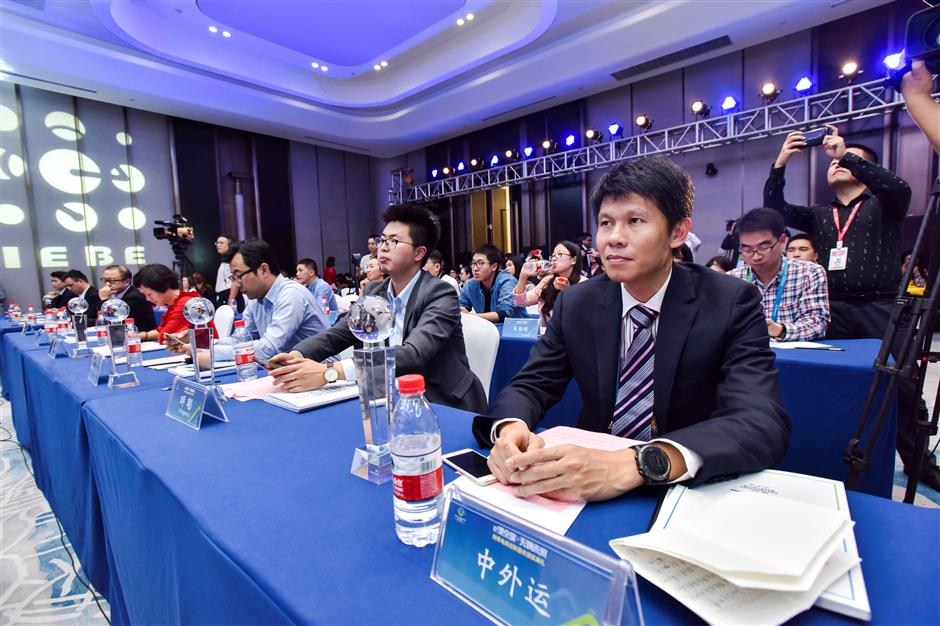E-commerce summit rewards innovators for cutting-edge projects and inventive ideas
The 2nd Global Cross-border E-commerce Summit attracted several successful industrial insiders and enterprise big hitters from home and abroad last week.
And one of the event’s highlights was the awarding ceremony to a galaxy of innovative service projects. The theme of this year’s competition was “e-commerce embraces the world, a future without borders.”
Nine prizes were given to 16 projects at the ceremony. Winners included giants such as Alibaba and Amazon to start-up businesses, including Trade Aider Co and Kuazhitong Co.
Six months ago, the city government invited project applications in sectors such as information sharing, financial services, smart logistics, e-commerce credit, data compilation and risk assessment.
Winners would be eligible for hefty subsidies and the opportunity to base their operations in Hangzhou industrial parks. The competition has attracted 311 projects from 15 domestic provinces and 14 foreign countries in total.
Prize-winning projects spanned a wide array of services.
Kuazhitong Co won the Legal Service Innovation Prize, by virtue of its intellectual property protection service for cross-border e-commerce business. It is believed to be the first legal firm to provide clients with overseas legal services.
“As we all know, attorney fees in foreign countries are much higher than in China. What we do is to lower expenditure for Chinese companies,” said Gao Jingjun, founder of the company. “We cooperate with overseas law firms and invite their lawyers to solve lawsuits. Since we prepare 90 percent of a case’s materials and documents, the attorney’s fee would be much less than before.”

Company representatives attend the award ceremony for the competition, whose theme was “e-commerce embraces the world, a future without borders.”
Many of Chinese companies are unaware of trademark and copyright issues when trading with other countries. Now, native lawyers who are familiar with local law systems can help them break down on copyright infringement cases.
“On foreign online shopping platforms, once a Chinese store is considered to have violated a local intellectual property protection law, it would be shut down immediately and all of the capital would be frozen,” said Gao. “Not long ago, we helped a cross-border company in Shenzhen, Guangdong Province, resolve his case in America, and its US$ 260,000 was unfrozen.”
Now the company cooperates with 70 to 80 law firms overseas. After winning the prize, Gao hopes to see more and more domestic cross-border e-commerce companies seeking cooperation with Kuazhitong.
“Hangzhou government helps us in promoting our business, inviting us to attend e-commerce summits, conferences and expos,” said Gao. “Rent subsidy is also offered to decrease our daily operation cost.”
E-commerce and traditional industries share some similarities. For example, products may require quality inspection before distribution.
Traditionally, when a Cantonese factory needs a quality-control inspector, it might invite a Shanghai engineer and spend a large amount of time and money to cover his long-distance trip. But, hiring professional quality-control staff can be difficult for companies headquartered in smaller cities.
Now, the sharing economy changes this situation, and Trade Aider Co can fill that gap. This year, it won the Technology Service Innovation Prize thanks to its online quality-control platform.
“There are more than 50,000 professional quality-control inspectors registered on our platform, covering more than 2,000 cities and counties,” Trader Aider spokesman Zhang Fan revealed. “We cash in on the Internet-plus trend and pool inspectors online. Clients just need to click a mouse and our system will dispatch the nearest inspector to their factories.”
Zhang said an inspector could arrive at the site within two hours. Without extra expenditure on transportation and accommodation, their charges tend to be cheaper than the market average.
Now, the company endeavors to build a rating system for quality-control inspectors, which would be the first of this kind in China. In the future, inspectors’ levels would vary according to skills and client’s evaluation, and in return the charges will differentiate.
Ever since President Xi Jinping proposed Silk Road Economic Belt and 21st Maritime Silk Road in 2013, the company has cooperated with a batch of B&R countries along the ancient routes.
“Domestic inspectors could supervise foreign factories via Internet, and our English-speaking customer service staff will offer help in communication,” said Zhang. “We hope to serve more and more companies and make our product famous across the world.”

Representatives receive awards for their innovative service projects at the 2nd Global Cross-border E-commerce Summit.
The Hangzhou Cross-border E-Commerce Comprehensive Pilot Area, which sponsored the competition, was established by the State Council, China’s cabinet, in March 2015. It was the first site of its kind dedicated to exploring solutions to problems in cross-border e-commerce trade.
The competition is one of its efforts to expand Hangzhou’s reputation as a hub for online innovation, with a special focus in cross-border trading.
The city’s exports and imports related to cross-border e-commerce has skyrocketed to US$7.26 billion from January to September this year, surging 27.88 percent from a year earlier. Industrial insiders consider the enormous success has largely been attributed to the city government’s policies that encourage innovation.
















